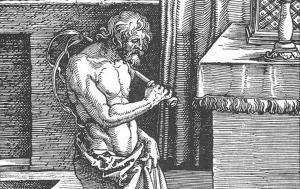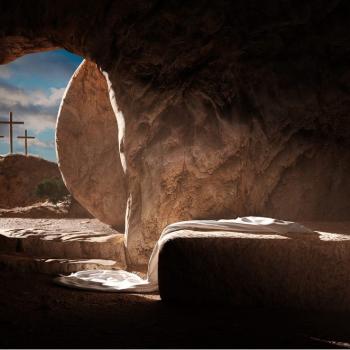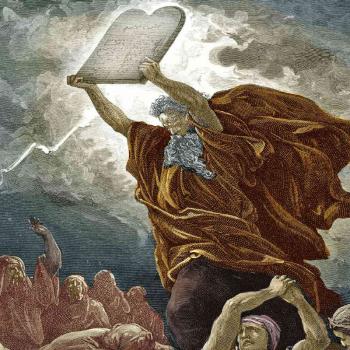
At the age of nineteen I was keenly aware that my spirituality lacked vitality. I wanted something deeper and better, but didn’t know how to get there. I’ve written before of how that changed, but that’s not the topic of this post. Before I found the answers that changed my life for the better, I explored a few dead ends, one of which was Calvinism.
The church I attended at that age was a large, reformist, Evangelical kind of place in Nottingham, where spiritual gifts were conspicuously absent, and there was no expectation of tangible interaction with God. The pastor preached long, weekly sermons I can’t remember much about, but he was a nice chap, and also my next-door neighbour. I spoke to him of my desire to grow, and he presented me with a book, which I attempted to read. It was wordy, intellectualised, and essentially a manifesto for Calvinism.
For a couple of weeks I was excited. The ideas I read about were presented as the esoteric secrets of the Christian faith – truths only the wise grasped, and I was quite keen to feel special. My flirtation with Calvinism was brief, but only because I found real answers to my spiritual questions, actual nourishment for my hunger, and met the Holy Spirit for real. The realities I was learning to perceive in the presence of God were kind, compassionate and supportive, but the tome I’d been given to read was dull, convoluted, and offered neither healing nor freedom. I let it go, without fully understanding what I’d briefly brushed up against, and only years later did I come to recognise the poison I nearly drank. Calvinism is the very opposite of the Gospel. It is condemning, fatalistic, and dreary. It is muscular and masculine, and shy of any feminine qualities in the divine.
Calvinism has five tenets, commonly referred to as TULIP:
Total depravity
Unconditional election
Limited atonement
Irresistible grace
Perseverance of the saints
This post is the first in a series of five, each of which will address one of these five points, to demonstrate that such thinking is the enemy of a meaningful relationship with God.
Total depravity. Calvin believed that humanity is ‘totally depraved’ and ‘utterly perverse’. Apologists argue that he meant this as a theological position – i.e. that humankind is affected by sin in every part – but even other reformists considered it too harsh, and saw fit to provide a gentler, more generous explanation of ‘original sin’.
I agree that we are all subject to flaws and weaknesses, and that we’ve fallen short of the glory of God. I also agree that we live in a ‘fallen’ environment, characterised by much that is destructive and hateful. I am convinced we all need the forgiveness of God, thorough Christ, but Calvin missed a crucial point that puts sin into context. He failed to notice our original goodness. Genesis 1:27-31,
‘So God created man in His own image, in the image of God He created him; male and female He created them. God blessed them; and God said to them, “Be fruitful and multiply, and fill the earth, and subdue it; and rule over the fish of the sea and over the birds of the sky and over every living thing that moves on the earth.”…And God saw all that He had made, and behold, it was very good.’
We are made in the image of God, and that image is fundamentally good. Calvinists take the view that we have no innate worth or goodness in ourselves, and that it is only by being objects of God’s grace that we have any worth, imputed to us rather than springing from within. This is incredibly harmful, and I would go so far as to say that to teach a child they are depraved, and have nothing good in them, is abuse. Each of us is a masterpiece, painted by God. We are in need of restoration, yes, but we are not fundamentally foul and depraved; we are fundamentally beautiful. In the very depths of us, we carry the image of our maker, and God doesn’t make trash.
‘I praise you because I am fearfully and wonderfully made; your works are wonderful,
I know that full well.’
Original goodness defines our true nature. Sin derailed and derails us, and we are urged to break free of it, but in Christ, we can overcome. Through the sacrifice of Jesus, we are forgiven and restored, and are empowered to break free of sin through the power of the cross. Romans 8:1-6,
‘Therefore, there is now no condemnation for those who are in Christ Jesus, because through Christ Jesus the law of the Spirit who gives life has set you free from the law of sin and death. For what the law was powerless to do because it was weakened by the flesh, God did by sending his own Son in the likeness of sinful flesh to be a sin offering. And so he condemned sin in the flesh, in order that the righteous requirement of the law might be fully met in us, who do not live according to the flesh but according to the Spirit.
Those who live according to the flesh have their minds set on what the flesh desires; but those who live in accordance with the Spirit have their minds set on what the Spirit desires. The mind governed by the flesh is death, but the mind governed by the Spirit is life and peace.’
We can know life and peace, overcoming sin because through Christ we were liberated from the laws of sin and death. What the law was powerless to do, God did through sending his own son.
I’m not advocating the possibility of sinless perfection, in this life. My experience is that the Holy Spirit helps us grow as issues arise, leading us to freedom one step at a time. Though painful at times, the result is joy and freedom, and a harvest of righteousness and peace. Hebrews 12:11,
‘No discipline seems pleasant at the time, but painful. Later on, however, it produces a harvest of righteousness and peace for those who have been trained by it.’
Our ultimate destiny is perfection. We began in Eden, and will end up in Heaven. In the meantime, we live in the Vale of Tears, but the events of this life will not wholly characterise the life to come. For eternity, we will rest in the wholeness of Christ, marked by his righteousness, in fellowship with each other and with God. This life then, is the twinkling of an eye; a light and momentary set of troubles. 2 Corinthians 4: 16-17,
‘Though outwardly we are wasting away, yet inwardly we are being renewed day by day. For our light and momentary troubles are achieving for us an eternal glory that far outweighs them all.’
I love that. We are being inwardly renewed day by day, as we overcome and walk with God, and even in the most painful moments, the lessons we learn achieve for us an eternal glory that far outweighs them all.
If our origin is goodness, and our destiny is perfection, any intermediary stage is temporary. If we identify with God’s goodness, and our upward call, we will grow, but if we identify with depravity, we will never break free of the habits and behaviours that harm ourselves and others. Calvinism presents a false image of God, reshaped in the image of fatalism, self-loathing, heaviness and powerlessness. In my experience, the spirit of Calvinism resists and quenches the Spirit of God. Let’s stick with Jesus. He is the image of the Father, the full manifestation of God. It is to him we turn for comfort and love, and it is his sweet tone we listen to. Matthew 11: 25-29,
‘At that time Jesus said, ‘I praise you, Father, Lord of heaven and earth, because you have hidden these things from the wise and learned, and revealed them to little children. Yes, Father, for this is what you were pleased to do.
‘All things have been committed to me by my Father. No one knows the Son except the Father, and no one knows the Father except the Son and those to whom the Son chooses to reveal him.
‘Come to me, all you who are weary and burdened, and I will give you rest. Take my yoke upon you and learn from me, for I am gentle and humble in heart, and you will find rest for your souls. For my yoke is easy and my burden is light.’
Who is it the Son chooses to reveal himself, and the Father? All those who are weary and burdened. All those in need of rest. In other words, everyone. God has the right to exclude, but his sovereign choice is to include. Not everyone will accept his grace, but I’ll deal with that when looking at the I in TUPIL – Irresistible grace.
















